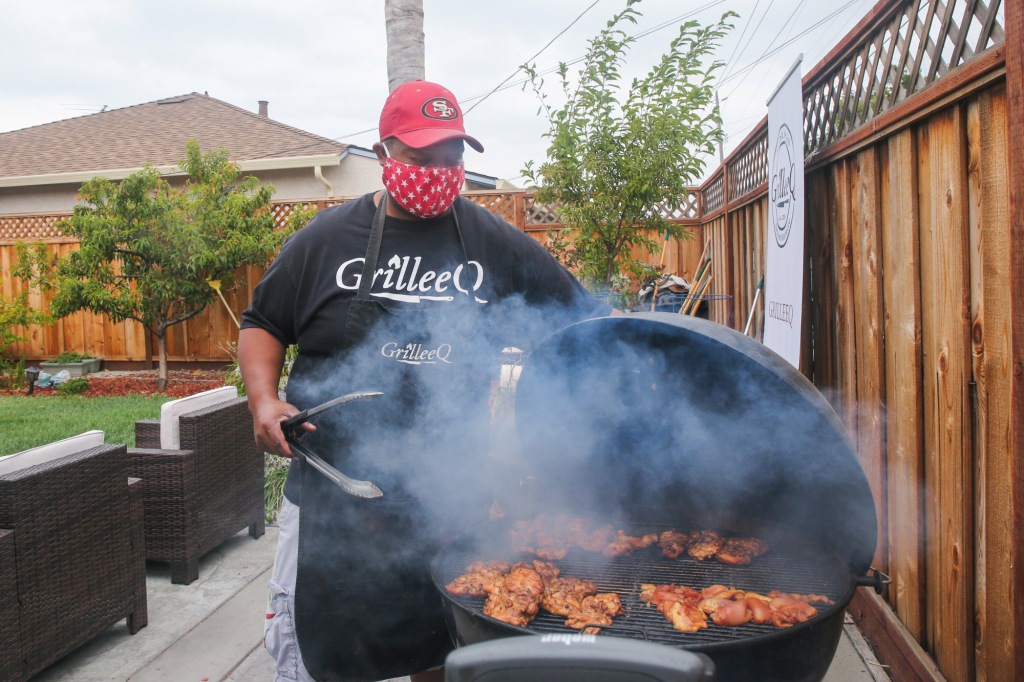Lee Thomas has been perfecting his grilling and barbecue techniques since his time in college.
And while he admits he “burned a lot of barbecue” in those days, the former San Leandro City Councilman has now spent almost three years putting his skills to use, cooking up all manner of grilled and smoked meats, veggies, and sweet and savory sides for local clients.
His custom barbecue meal business, dubbed GrilleeQ, started around 2019, with Thomas cooking private meals in clients’ backyards. During the pandemic, he switched over to a pickup model, where customers come to him to grab their pre-ordered barbecue feasts.
Now, his business is fully legit. State assembly Bill 626 became law in 2019, authorizing “Microenterprise Home Kitchen Operations” or “MEHKOS,” and allowing individual counties to opt in and create their own permitting and inspection processes. Alameda County adopted the new rules earlier this summer. While Thomas was the first to nab a permit from the county’s health department, he said the change in the law was long overdue for home cooks, and needed even more so during the pandemic.
Thomas said the new rules will allow more people to earn income without having to invest in a restaurant space or food truck, and it will expand the number of unique dining options for people all over the region. He’s working with a local organization called Cook Alliance, which advocated for the law, with the hopes of helping others clear the permitting and inspection hurdles to get their businesses off the ground.
This conversation has been edited for length and clarity.
When did you start this business?
This is my third summer. I started it after I was off the council and I was out of office as of December 2018.
Is GrilleeQ a full time job for you?
This is the weekend gig. Monday through Friday I work for Oakland Unified School District as a Community School Manager. And I serve as president of the Administrator’s union in the school district.
How did you get started?
I originally started doing this by going to people’s homes and barbecuing in their backyard, and that was my way of building my clientele until we could get this bill passed. And then Covid hit, well all of the sudden that game was over. But some of those very same clients that I cooked for reached out to me during the pandemic when the supermarkets were crazy. They said ‘Hey Lee, can you cook me a dinner? And it was right then that I pivoted, and started doing these customized dinners for folks even though I knew it still wasn’t legal.
Why join up with Cook Alliance?I’m blessed to be able to have a Monday through Friday job, and kind of do this as a passion and a hobby. But I am very mindful that the way this bill came out, and the way Cook Alliance worked to get this bill passed, was really to help some people who really need to generate income, to cook to survive.
I find this extremely important. A lot of minorities, immigrants, women, and people of color, they’re never going to be able to open a restaurant. But this really is a stepping stone for them to be able to be independent, create their own income, and when you really think about this, it builds community. When you’re fixing meals for neighbors, that’s community in itself.

How do you get business right now? How do customers come to you and what’s the order fulfillment process like?
Right now people go on my website, or they follow me on Facebook or Instagram. They’ll call, and they’ll ask how much is it do chicken, corn, and pulled pork sandwiches, let’s say. You put your order in with me by Wednesday or Thursday, they put a deposit down, then I shop for you. The food is at its freshest point. There’s nothing coming out of our freezer here. I shop before I go to work in the mornings or after work. Then, I’ve got a time set on a Saturday or Sunday for them to come by and pick up the food. They come to my house, I’ve got a side gate here, and I have their meal ready for them.
When you go get your car fixed, they usually show you how much your parts cost, and then they show you the labor. So that’s what you get from me, you see the actual cost of your food, and then you see the labor that I charge you for doing this.
You have a big menu that includes poultry, pork, beef, veggies, and seafood, among other items. What’s the most popular with customers?
I try to be a little bit different than what you might find at a traditional barbecue joint. I’ve got longanisa on there. I do blueberry cornbread muffins, I do a Korean-style short rib. I’m working on a Burmese garlic noodle dish, because my wife is Burmese and Chinese. By far, some of the most popular stuff that I do is the boneless skinless chicken thighs. I make a sauce that goes with it, and a lot of people are really in love with that. I’ve got a couple of clients, they’ve coined it as Cali Thighs. The pulled pork is another one that I do a lot for folks. It’s like a 15-hour cooking process.
That seems like a lot of pressure to ensure you turn out meals on time.
There’s tons of pressure when you’re smoking a pulled pork for somebody, it can be quite worrisome. But you know, I’m diligent, and I get up multiple times throughout the night just to ensure that the temperature is where it’s supposed to be, and that I’ve got enough fuel working. There’s also just something about the challenge and the craft of being able to see that end result.
The best feeling is when the customer drops me a text or they’ll post something on Facebook, just talking about how happy they are. That’s the ultimate win right there.

Has the pandemic had any broad impacts on your business?
The pandemic helped me because it made me pivot and move my business model to a pickup model that I was waiting for. It made me do it sooner than later. But also, as we currently speak, meat has become extremely expensive over these last few weeks. And unless I’m like some big barbecue joint buying pounds and pounds of meat through a distributor, the challenge is in trying to keep the costs down because barbecue is already expensive.
For example, I did some pulled pork sliders for a client a couple months ago. And she came back to me recently and she wanted to do some more sliders, but my price had increased, and I had to explain that was because the price of pork went up. So the end result was we didn’t do business.
Have you seen more business or less business overall during the pandemic?
I definitely think I’ve seen more business since the pandemic. Especially with the restaurant situation, eating outdoors, or people not being comfortable with going into restaurants. And in all honesty, I also just happen to be in a city where there’s very few barbecue options.
What will be the challenges or barriers for people under the new rules for home kitchen businesses?
I think it always comes back to money. I also think technology is going to be a barrier for some folks. That’s why myself and Cook Alliance are strategically thinking about what kind of technical aspects we’re going to be able to help people with for their home businesses. Venmo, Square, Instagram, Facebook set them up for success on social media platforms, so they are able to really advertise and run their business.
Another challenge we see with this program is the permit costs of $696 per year. It’s pretty steep. San Mateo County has attached a grant program to theirs. Another county has tiered pricing for permits. So we’re going to have to work hard to find funding to help some folks in Alameda County. Maybe like a ‘sponsor a cook’ program. You’re looking at $1,500 to $2,000 potential startup costs. Because if you say $700 for the permit, then you’re going to spend another $150 or $160 on the food handling license. And then any kind of potential marketing you might do. You want to design a logo for yourself. Add in extra kitchen materials, pots, pans, to-go boxes. Those are all things you’re going to have to buy ahead of time.
Where did you pick up the skill from?
College. I burned a lot of barbecue in college. I attended University of San Francisco and I had some friends who attended Santa Clara University. And so we went back and forth between schools hanging out with each other on weekends. We’d tell people, come over to our house, we’re barbecuing. But the deal was if you come over to our house for barbecue, you had to bring the liquor and booze. But the real winners were us at the end of the night, because when everyone left, there was always liquor and booze left. As much as I love this craft, I always laugh, because that was part of the starting point to all of this.
Name: Lee Thomas
Age: 44
City: San Leandro
Title: Founder, GrilleeQ
Family: Wife, Ida and two daughters, ages 11 and 13
Five things to know about Lee Thomas
1. His favorite dishes on his own menu are bone-in chicken thighs and bacon-wrapped shrimp.
2. His older daughter is sick of the barbecue smell, but still enjoys the food, though she prefers no BBQ sauce. His younger daughter is very interested in the science of barbecuing and helps out with the business.
3. Thomas was born and raised in San Francisco’s Western Addition, and moved to San Leandro in 2006.
4. Though he lives just a few minutes away from the Oakland Coliseum, because of his SF upbringing, Thomas said ‘We only root for the Niners and Giants in this house. The blood lines are red and gold, black and orange.’
5. The name of his business, GrilleeQ, is a play on the words on grill, barbecue, and his fist name, Lee.










